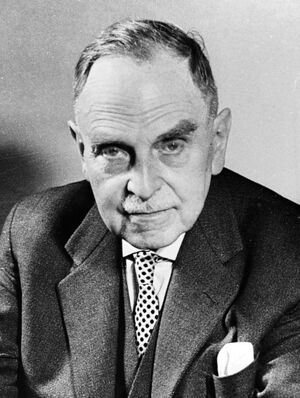Otto Hahn (nonfiction): Difference between revisions
(Created page with "thumb|Otto Hahn (16 April 1970).'''Otto Hahn''', OBE, ForMemRS[1] (8 March 1879 – 28 July 1968) was a German chemist and pioneer in the fields of...") |
No edit summary |
||
| Line 1: | Line 1: | ||
[[File:Otto_Hahn_1970.jpg|thumb|Otto Hahn (16 April 1970).]]'''Otto Hahn''', OBE, ForMemRS | [[File:Otto_Hahn_1970.jpg|thumb|Otto Hahn (16 April 1970).]]'''Otto Hahn''', OBE, ForMemRS (8 March 1879 – 28 July 1968) was a German chemist and pioneer in the fields of radioactivity and radiochemistry. He was exclusively awarded the Nobel Prize in Chemistry in 1944 for the discovery and the radiochemical proof of nuclear fission. He is referred to as the father of nuclear chemistry. | ||
Hahn was an opponent of national socialism and Jewish persecution by the Nazi Party. [[Albert Einstein (nonfiction)|Albert Einstein]] (who was born six days after him) wrote that Hahn was "one of the very few who stood upright and did the best he could in these years of evil". | Hahn was an opponent of national socialism and Jewish persecution by the Nazi Party. [[Albert Einstein (nonfiction)|Albert Einstein]] (who was born six days after him) wrote that Hahn was "one of the very few who stood upright and did the best he could in these years of evil". | ||
After World War II, | After World War II, Hahn became a passionate campaigner against the use of nuclear energy as a weapon. | ||
He served as the last President of the Kaiser Wilhelm Society (KWG) in 1946 and as the founding President of the Max Planck Society (MPG) from 1948 to 1960. Considered by many to be a model for scholarly excellence and personal integrity, he became one of the most influential and respected citizens of the new Federal Republic of Germany. | He served as the last President of the Kaiser Wilhelm Society (KWG) in 1946 and as the founding President of the Max Planck Society (MPG) from 1948 to 1960. Considered by many to be a model for scholarly excellence and personal integrity, he became one of the most influential and respected citizens of the new Federal Republic of Germany. | ||
| Line 22: | Line 22: | ||
* [https://en.wikipedia.org/wiki/Otto_Hahn Otto Hahn] @ Wikipedia | * [https://en.wikipedia.org/wiki/Otto_Hahn Otto Hahn] @ Wikipedia | ||
[[Category:Nonfiction (nonfiction)]] | [[Category:Nonfiction (nonfiction)]] | ||
[[Category:Chemists (nonfiction)]] | [[Category:Chemists (nonfiction)]] | ||
[[Category:People (nonfiction)]] | [[Category:People (nonfiction)]] | ||
Latest revision as of 18:42, 23 July 2017
Otto Hahn, OBE, ForMemRS (8 March 1879 – 28 July 1968) was a German chemist and pioneer in the fields of radioactivity and radiochemistry. He was exclusively awarded the Nobel Prize in Chemistry in 1944 for the discovery and the radiochemical proof of nuclear fission. He is referred to as the father of nuclear chemistry.
Hahn was an opponent of national socialism and Jewish persecution by the Nazi Party. Albert Einstein (who was born six days after him) wrote that Hahn was "one of the very few who stood upright and did the best he could in these years of evil".
After World War II, Hahn became a passionate campaigner against the use of nuclear energy as a weapon.
He served as the last President of the Kaiser Wilhelm Society (KWG) in 1946 and as the founding President of the Max Planck Society (MPG) from 1948 to 1960. Considered by many to be a model for scholarly excellence and personal integrity, he became one of the most influential and respected citizens of the new Federal Republic of Germany.
In the News
Fiction cross-reference
Nonfiction cross-reference
External links:
- Otto Hahn @ Wikipedia
